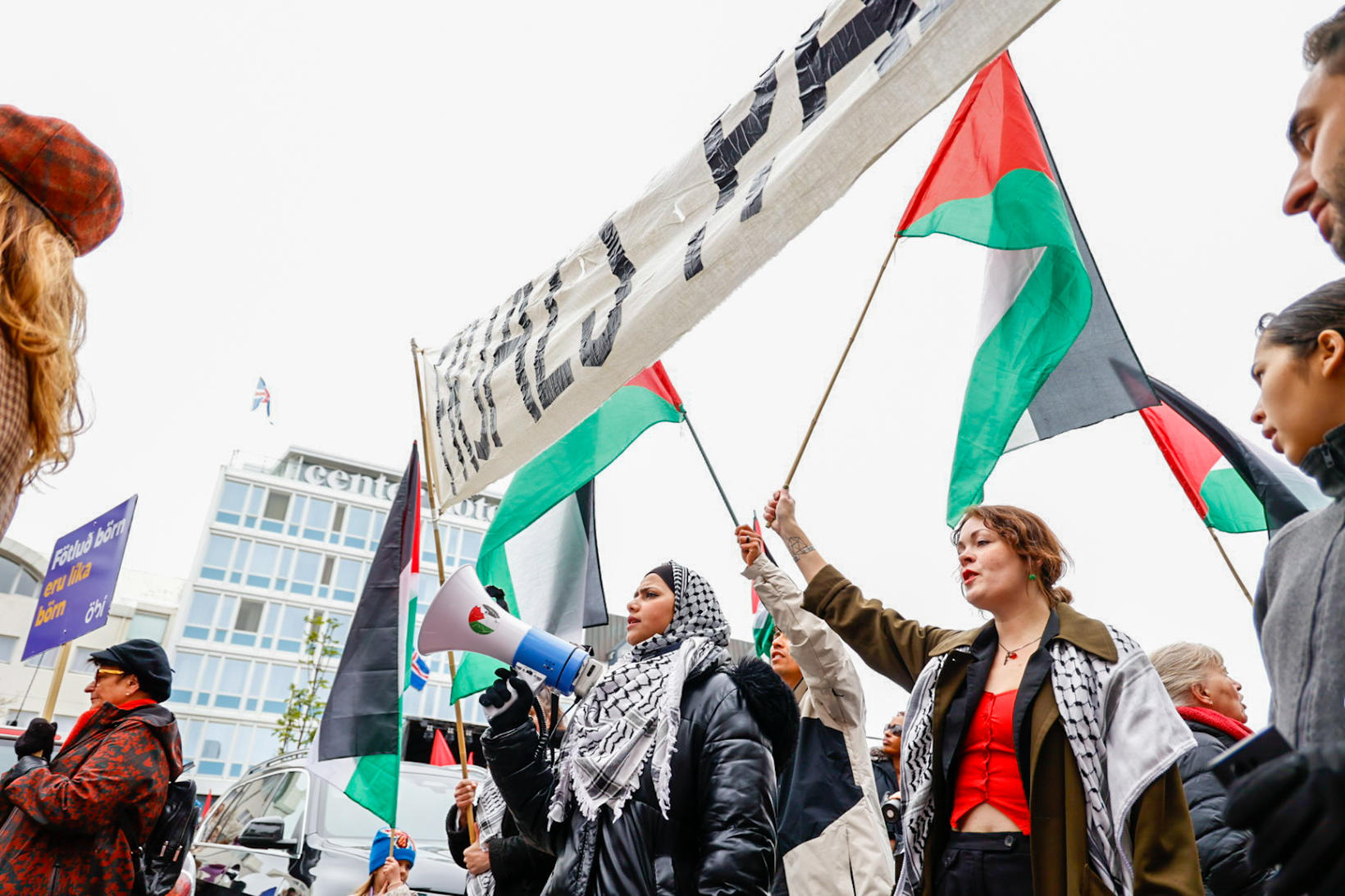The ‘Faber-Bonus’: a flow location where the status holder will no longer get away

Majed Nameh (42) smokes a cigarette in the bicycle shed. There are cycling around him, a wooden picnic table and a black office chair. The Syrian takes his phone and speaks a message that is translated immediately. « Good morning, » says the Google-Real voice, « I live here. » Name points to the building next to the bicycle shed.
The Syrian has a residence permit, but was not yet assigned his own house. He lives with forty other refugees who are also waiting for a house, in a former school building in Nijkerk in Gelderland. It is a so -called ‘flow location’. A bed, a TV and a fridge just fit in his room. The residents, especially men, share six showers and a kitchen with two stoves. For Nameh it is a progress: for this he shared one room with five others in the asylum seekers’ center of Vlissingen.
If people finally get a house after seven years of waiting, it’s too late, then they don’t make the step to integration anymore
Nevertheless, Name would prefer to leave as soon as possible. He peeves at another resident a few meters away, bends forward and whispers: « There is one Christian person here: me. » Other residents blamed him for not participating in Ramadan, he says as he ends the reception site. « They don’t want me to smoke or eat, but we are in the Netherlands. I secretly eat in my room. »
In anticipation of your own house, status holders in flow locations live in eighteen places in the Netherlands. The government wants more of such reception centers to open and with a financial regulation, Minister Faber (asylum, PVV) tries to seduce municipalities to do so, so that the pressure on the regular, overcrowded reception centers and status holders can already start integrating. But the Association of Dutch Municipalities (VNG) warns its members not to yield to the ‘Faber-Bonus’. It is a one -off 30,000 euros per status holder collected. There are « far -reaching risks » to the reception form, the VNG states. Refugees are in danger of being detained for years in flow locations – at the expense of the municipalities.
‘Not sober enough’
Every year, around fifteen thousand refugees receive a residence status in the Netherlands. They have to live somewhere, but there are not enough houses available. At the moment, around twenty thousand status holders are stuck in the COA asylum seekers’ centers, where they wait for them to be assigned a home in a municipality.
To get them out of the shelter, the flow location was devised by then State Secretary Eric van der Burg (VVD, Justice and Security) from the previous cabinet. There, status holders can « start working and integrating, » Faber wrote to the Chamber earlier. According to her, the flow locations contribute to participation and integration. In addition to the reimbursement for recorded status holders, Faber also pays the possible renovation of the reception locations. For example, the municipality of Nijkerk received 641,000 euros from the government to make the old school building habitable.
There are no clear rules that housing must comply. Faber speaks in a letter to the House of Representatives of a « preferably non -independent » living space. Earlier she rejected a flow location in Apeldoorn, because status holders would get their own bedroom. Faber thought that was « not sober enough. »
NRC mapped the eighteen flow locations paid by Faber. It turns out: everywhere status holders have their own rooms. The PVV minister thus finances flow locations that do not meet its own requirements.
The locations themselves differ greatly from each other, both in size and in guidance for the status holders. Although Minister Faber prefers to see large locations – she does not mention a minimum number – not all flow locations do not comply with it. Eleven young status holders stay in a former care center in Waalwijk; In Zwolle they are together in a converted office building and in Brummen, Gelderland, 26 people live in a dilapidated villa on an estate. Seven status holders live in a flow location in the Oude IJsselstreek. And in North Limburg Horst aan de Maas, hundreds of status holders live in a holiday park.
/s3/static.nrc.nl/images/gn4/stripped/data131628939-816b90.jpg|https://images.nrc.nl/cUSDwYFzWP2I7X6fGfQYbMLItPU=/1920x/filters:no_upscale()/s3/static.nrc.nl/images/gn4/stripped/data131628939-816b90.jpg|https://images.nrc.nl/9QSg4uRE5of86OhfNdCHtppf3Po=/5760x/filters:no_upscale()/s3/static.nrc.nl/images/gn4/stripped/data131628939-816b90.jpg)
Photo Ruben Meinten
Workshop
The supervision of the status holders at the locations differs and is arranged by employees of the municipalities. In the old school building of Nijkerk, Brigitte van Bennekom takes care of all residents in the service of the municipality. She walks through the living room, where Beige Ikea benches stand in front of a crooked television screen. On the wall there is a painting with the text ‘collaboration’ on it. « It comes from the old town hall, » says Van Bennekom. The location manager has taken the painting and some other framed texts itself « to cheer things up here ».
In the living room, status holders with workshops are familiar with in the Netherlands, says Van Bennekom. They are explained how an OV card works, how to open a bank account and when benefits and care allowance are transferred. More household topics are also covered, says Van Bennekom, such as cleaning up. « Because, » she says, « If you don’t clean here, you will not do it in your own house. » The purpose of the location manager in Nijkerk is to prepare status holders for their own home. « They are here for a maximum of twelve months, » she says. « At least: that’s the intention. »
/s3/static.nrc.nl/images/gn4/stripped/data131630458-8d04e5.jpg|https://images.nrc.nl/FLqG_7Dccsj-nPQggyRVVdt-xt0=/1920x/filters:no_upscale()/s3/static.nrc.nl/images/gn4/stripped/data131630458-8d04e5.jpg|https://images.nrc.nl/PdyKv_gzIyApTC0ir5tBL0MvY-A=/5760x/filters:no_upscale()/s3/static.nrc.nl/images/gn4/stripped/data131630458-8d04e5.jpg)
Photo Stefan Koopmans
But new government policy threatens not to be temporary. The cabinet no longer wants to give status holders priority over social rental properties. The result: the flow to a private house is standing and status holders get stuck in flow locations for years. « They will be searching-it-out locations, » says VNG chairman Sharon Dijksma, also mayor of Utrecht.
PAREllelle society
The Syrian Wahid, who does not want to be in the newspaper with his last name in connection with his privacy, quickly opens the window of his small room in the flow location just outside Raalte – a former estate in a wooded area. It smells stale and his bed is littered with things. There are a TV, fridge and a table. Furthermore: a sink and a shower. For this, the 41-year-old Wahid pays 450 euros per month rent. A reasonable price, according to location leaders Timo de Jong and Marije Stalknecht, tourists pay a similar price for a midweek or a weekend.
Wahid has been in the Netherlands for six years and has been living at the flow location since February 2024. The area here is fine, he says, but there is little to do. He goes to school in Raalte, in Zwolle he shops. But he mainly wonders when he gets a house from the municipality.
That question keeps all residents busy, says De Jong. « Residents ask: how long do I have to wait? » He always answers the same thing: « You don’t have to wait. Your life in Raalte starts here. One day you get a house. »
In Raalte, status holders are « very nicely » prepared for their step to independent living. Stalknecht and De Jong help with practical and bureaucratic matters, such as paying bills and taking out health insurance, but reception in the flow location should not last endlessly.
Read also
Castricum ‘Shames dead’ for container houses status holders. ‘Such a rich municipality. We can really do this better ‘
In February, Mona Keijzer, Minister of Housing and Spatial Planning, submitted a bill that must ensure that status holders no longer have priority in social rental properties. Sixteen municipalities – including Amsterdam, The Hague, Haarlem and Utrecht – are « stunned » about this, they write in a joint letter, because the flow holders to houses get stuck even more. An employee of the municipality of Raalte: « It is nice if people come closer to integration through the flow location, but if the housing stock does not grow, it will stop here. » Stalknecht: « At some point it is full here, and then? »
It is not your own house, it is temporary and you know that, you cannot carrot and build your own network
Ricky van Oers, assistant professor at Radboud University, is critical of the shelter in transfer locations. The status holders will be put on hold for so much longer: the integration of this group only starts when they live ‘among the Dutch’, she says. In a flow location, they are still not part of Dutch society. « The flow locations form a Parellelle society: it is not your own house, it is temporary and you know that, so you can’t take carrots and build your own network. »
/s3/static.nrc.nl/images/gn4/stripped/data131623439-a50738.jpg|https://images.nrc.nl/xky5D98zyNOiyyp4I29u4Ah6AEg=/1920x/filters:no_upscale()/s3/static.nrc.nl/images/gn4/stripped/data131623439-a50738.jpg|https://images.nrc.nl/mADdA9JYN4w_OomTsntNeqKCI8U=/5760x/filters:no_upscale()/s3/static.nrc.nl/images/gn4/stripped/data131623439-a50738.jpg) The Silja Europe ship in Rotterdam is also currently being used as a flow location for refugees with a residence status in the Netherlands.
The Silja Europe ship in Rotterdam is also currently being used as a flow location for refugees with a residence status in the Netherlands.
Photo Hedayatullah Amid
According to Van Oers, research shows that the consequences of the long wait for status holders are great. In the beginning, people are very willing to participate, the researcher says, but the longer the period of « forced inactivity » takes the more time someone needs to participate in the labor market well. Due to the long wait in asylum seekers’ centers and flow locations, status holders lose their skills and do not teach new ones, says Van Oers. « Ultimately, much more of them will have to rely on social assistance. »
The Christian Syrian Majed Name is now going to school three days a week and he works for two days in a car garage in Amersfoort. He’s tired of waiting. A friend of his has been assigned a house in Nijkerk. « I may have to wait another year. »
Read also
Status holders are stuck on Rotterdam cruise ferry: ‘I smoke, sleep and wait’
<dmt-util-bar article="4891837" data-paywall-belowarticle="" headline="De ‘Faber-bonus’: een doorstroomlocatie waar de statushouder niet meer weg komt « URL = » https://www.nrc.nl/nieuws/2025/05/01/de-faber-bonus-een-en-enstroom location-waar-de-statushouder-niet-more

:format(webp)/s3/static.nrc.nl/bvhw/files/2025/03/data129745232-2d6e75.jpg)
:format(webp)/s3/static.nrc.nl/wp-content/uploads/2025/03/19171054/data129617191-246dae.jpg)
:format(webp)/s3/static.nrc.nl/wp-content/uploads/2025/04/16153044/data130910849-76d19c.jpg)
:format(webp)/s3/static.nrc.nl/wp-content/uploads/2024/11/22123531/data124447261-c1af61.jpg)
:format(webp)/s3/static.nrc.nl/wp-content/uploads/2025/03/21170512/web-2203BIN_TimmermansDEF.jpg)


